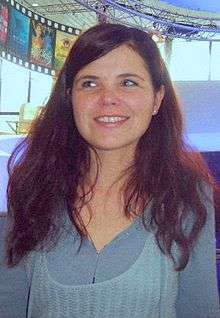Julia Franck
Julia Franck (born 20 February 1970, in East Berlin) is a German writer.
Julia Franck | |
|---|---|
 Franck in 2007 | |
| Born | 20 February 1970 Berlin, East Germany |
| Occupation | novelist |
| Nationality | German |
| Notable works | Die Mittagsfrau |
| Notable awards | German Book Prize 2007 |
| Website | |
| www | |
Life
Julia Franck, a twin, is the daughter of the actress Anna Franck and of the television producer Jürgen Sehmisch.
In 1978 the family moved to West Berlin where they spent nine months in a refugee camp. and later to Schleswig-Holstein. Franck studied German Literature and American Studies at the Free University of Berlin and spent some time in the United States, Mexico and Guatemala. She worked as an editor for Sender Freies Berlin and contributed to various newspapers and magazines. She lives with her children in Berlin.
Literary works
Franck is the author of five novels, one short story collections, and the editor of a collection of essays. Her three most recent novels, Lagerfeuer, Die Mittagsfrau, and Rücken an Rücken, as well as the collection Grenzübergänge, engage explicitly with twentieth-century German history. Lagerfeuer is set in the West Berlin refugee camp Berlin-Marienfelde in the 1970s and follows four main characters, one of whom, Nelly Senff, has fled East Berlin with her two young children. Rücken an Rücken is also set during the years of Germany's division, ending in the early 1960s, and Die Mittagsfrau spans from World War I to divided Germany of the 1950s.
Although Franck has not described herself as a feminist author, feminist scholars have noted her presentation of women's experience of history, power structures, sexuality, and relationships (such as motherhood).[1]
Julia Franck's books have been translated into over 35 languages, including Albanian, Brazilian Portuguese, Bulgarian, Chinese, Danish, Estonian, Finnish, French, Georgian, Greek, English, Hebrew, Italian, Japanese, Korean, Croatian, Lithuanian, Macedonian, Dutch, Norwegian, Polish, Rumanian, Swedish, Serbian, Spanish, Catalan, Galician, Taiwanese, Czech, Turkish, Hungarian and Belarusian
Family connections
Franck is the granddaughter of sculptor Ingeborg Hunzinger (1915-2009) and a great granddaughter of the artist and illustrator Philipp Franck (1860-1944).[2]
Awards and honours
- 1995 Open Mike prize of the Literaturwerkstatt Berlin
- 1998 Alfred-Döblin-Stipendium of the Akademie der Künste
- 2000 3sat award of the Ingeborg Bachmann Competition
- 2004 Marie-Luise-Kaschnitz Prize
- 2005 Rowswitha Prize of the city of Bad Gandersheim
- 2007 German Book Prize
- 2010 short list for the Independent Foreign Fiction Prize for Blind Side of the Heart[3]
- 2010 short list for the Wingate Literary Prize for the Jewish Quarterly
Works
- Liebediener (1999)
- Bauchlandung (2000)
- Lagerfeuer (2003)
- Mir nichts, dir nichts (2006)
- Die Mittagsfrau (2007) (UK: The Blind Side of the Heart (2009); US: The Blindness of the Heart) (2010), translated by Anthea Bell
- Grenzübergänge (2009), anthology, edited by Julia Franck
- Rücken an Rücken (2011) (UK: Back to Back (2013); US: Back to Back) (2013), translated by Anthea Bell
Translations
. Rebecca Solnit. Aus der nahen Ferne. Hoffmann und Campe, Hamburg 2014.
Film adaptions
West, a 2013 German film adaptation of the novel Lagerfeuer opened in US-American theatres on November 7, 2014.
Notes and references
- Hill, Alexandra. Playing House: Motherhood, Intimacy, and Domestic Spaces in Julia Franck's Fiction. Peter Lang.
- Julia Franck (23 July 2013). "On the Track of Family History". Jewish Quarterly. Archived from the original on 3 October 2017. Retrieved 2 October 2016.
- "Shortlist for the Independent Foreign Fiction Prize 2010 revealed - RobAroundBooks". RobAroundBooks. Retrieved 2015-10-23.
External links
- review of The Blind Side of the Heart on The Times online
- Julia Franck in the German National Library catalogue
- Interview with Julia Franck on The Ledge, an independent platform for world literature. Includes excerpt and audio.
- Interview with Julia Franck
- Press reviews on perlentaucher.de (in German)
- Julia Franck on German Wikipedia de:Julia Franck
- Die Mittagsfrau on German Wikipedia de:Die Mittagsfrau